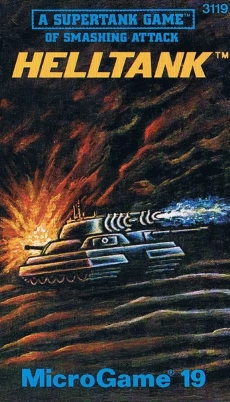This article relies largely or entirely on a single source .(May 2024) |
Raumkrieg is a play-by-mail wargame that was published by Flying Buffalo.
This article relies largely or entirely on a single source .(May 2024) |
Raumkrieg is a play-by-mail wargame that was published by Flying Buffalo.
Raumkrieg is a play-by-mail game set in a two-dimensional space arena, where five to nine players command their fleets to destroy each other. [1]
W. G. Armintrout reviewed Raumkrieg in The Space Gamer No. 19. [1] Armintrout commented that "Raumkrieg has the advantage of being a reasonably simple game." [1]
Adventure Gaming was a consumer magazine published by Manzakk Publishing, Inc. covering all aspects of the burgeoning gaming industry. It ran for 13 issues starting in July 1981. The magazine ceased publication in 1982.

Lords of the Middle Sea is a 1978 board wargame published by Chaosium. Designed by Lynn Willis, with art by William Church and Gene Day.
Mind War is a 1976 board wargame published by Fact and Fantasy Games.
Quazar is a 1977 board wargame published by Excalibre Games.
Cyborg is a 1978 board wargame published by Excalibre Games.
The Warriors of the Green Planet Trilogy was a series of three games published in 1976 by Fact and Fantasy Games.

Pegasus was a gaming magazine published from 1981 to 1983 by Judges Guild.
The Generic Gangster Chase Game is a 1981 board game published by Generic Games.
Saga is a 1980 board game published by TSR.
Star Cluster One is a play-by-mail game published by The Buchanan Company.

The Nuts & Bolts of PBM was a magazine dedicated to play-by-mail games, first published in June 1980 as Nuts and Bolts of Starweb, and edited by Richard J. Buda. The magazine incorporated in 1983 to Bolt Publications. Rick Loomis of Flying Buffalo Games stated in 1985 that the Nuts & Bolts of PBM was the first PBM magazine not published by a PBM company. He stated that "It was a fun magazine, but somewhat ahead of its time, and it had no financial backing." Afterward, the name changed to Nuts & Bolts of Gaming.
Starlord is an open-ended, computer moderated, space-based play-by-mail game. Designed and moderated by Mike Singleton, gameplay began initially in the United Kingdom, with Flying Buffalo launching a version in the United States in 1983. Gameplay was limited to 50 players roleplaying as Starlords with the goal of becoming emperor by conquering the Throne Star. Starlord was reviewed multiple times in magazines such as Dragon and The Space Gamer in the early 1980s, receiving generally positive reviews, with one reviewer noting the possibility of the game lasting for years.

Helltank is a science fiction board wargame published by Metagaming Concepts in 1981 as part of its MicroGame line. The game simulates combat in the future between a supertank and more conventional forces.
Cyborg is a play-by-mail game that was published by Integral Games beginning in 1981.
Catacombs of Chaos is a play-by-mail game that was published by Schubel & Son.

Galactic Conflict is a space-based, computer-moderated, play-by-mail game originally published by Flying Buffalo in 1982. As August 2021, Rick Loomis PBM Games took over as game publisher. During gameplay, six to fifteen players expand across the galaxy, building industrial capacity and pursuing Civilian Projects through various means. Some player diplomacy is typical. The game received multiple reviews in the early 1980s, receiving generally positive comments.
Star Venture is a play-by-mail game begun by Schubel & Son in 1982. The game was open-ended and computer moderated.
Alien Conflict is a play-by-mail game by Schubel & Son begun in 1983.
Strategic Conflict is a play-by-mail game by Schubel & Son begun in 1983.
Silverdawn is a fantasy role-playing play-by-mail game (PBM). The human-moderated, open-ended game was designed by Jim Dutton and published by Entertainment Concepts, Inc. in 1981. Players selected characters with classes such as cleric, fighter, ranger, thief, along with races and various attributes. Additional starting variables included spells and weapons. Diplomacy was not part of Silverdawn, gameplay was solo without interaction with other players. The setting was the world of Nyarna. The game's flexible narrative gaming system allowed players to choose good or evil paths. Silverdawn received two generally positive reviews in the early 1980s with one reviewer noting some drawbacks to the game.